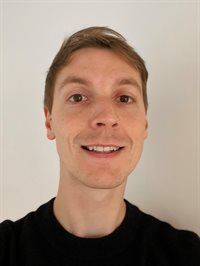Knowledge Exchange Manager at Satellite Applications Catapult
PhD Astrophysics, 2021
 Please tell us a bit about your current role
Please tell us a bit about your current role
As Knowledge Exchange Manager I am responsible for leading engagement with and building collaborations between academic and research organisations, the Satellite Applications Catapult, and industry across the UK and internationally. I deploy a wide variety of Knowledge Exchange (KE) mechanisms, networking, and research coordination to facilitate these connections. I work closely with stakeholders to develop knowledge of leading-edge research, develop good relationships with the research base, and scope out exciting and innovative collaborative bids and projects.
Following the completion of my PhD, I knew I wanted to work in the space sector but was not quite sure in which role. I applied directly to the Satellite Applications Catapult for a couple of roles, as I was confident this would open up several opportunities in the UK space sector. The KE Manager role allows me to utilise my experience of academic research, my prior industry experience, and technical knowledge to accelerate the adoption of academic research.
What motivated you to do your postgraduate research course?
Before my PhD and after completing my MSc I had previously said: "I am finished with university, I do not want to do a PhD". However, during my role as a Systems Engineer at Teledyne e2v, I developed a strong relationship with the National Quantum Technology hubs which brought me back to the exciting world of academia, which tempted me back in. In parallel, a colleague was completing a PhD part-time and suggested that if I were to ever want to do a PhD, they recommended (tongue-in-cheek) to "do it whilst I was still young and without children".
I have a perpetual curiosity for the way things work and when the opportunity to do a PhD linked to Space Weather applications which could support the UK Met Office's Space Weather operations arose, I decided that it was the right time and the right subject for me and hence I decided to seize the opportunity. Another motivating factor was that I felt I had not developed sufficient data analysis skills up to that point and I wanted to dive into a new challenge which would accelerate the development of novel data analysis skills.
What do you enjoy most and what do you find challenging about your role?
My role as KE Manager finds me engaging with leading academics and learning about the current bleeding edge development in the space sector. This is highly rewarding and working closely with the Chief Technology Officer at the Satellite Applications Catapult, we are able to provide context and direction to the latest research. In my role I facilitate workshops and plan events. I find this to be rewarding but they are challenging logistically. However, overall, I would say that the most challenging thing about the role is time limitations. There are many research areas to cover and endless collaborations to facilitate, but only a limited time in the working week. Therefore, managing my time is a significant challenge.
Have you faced any barriers during your career journey, if so, how did you overcome them?
No specific barrier comes to mind that I could elaborate on, but I would say that in the post-COVID world, hybrid working has introduced new barriers in our working lives and locations of work, balancing work, travel, and life. I would say that the best way to overcome any of these issues is to speak. Speak to your manager, colleagues, associates, friends, and family. It's always very useful to consider lots of perspectives and to talk through your challenges rather than assume they will eventually get resolved.
What advice would you give to students interested in further study?
Go for it but do it wisely. I would recommend that you think deeply about why you are choosing further study and what you hope to get out of it. Then approach institutions to learn about what you will be offered and what experiences, skills, and knowledge you will gain. Balancing the programme with what you would seek to develop will likely lead to a beneficial experience.
How did your time at Birmingham help you prepare for this role?
My role at Birmingham allowed me to liaise with a wide variety of people and I learnt how to navigate my way speaking about technical subjects with those with high capital (i.e., professors and lecturers) and those with low capital (i.e., the general public). Furthermore, as my PhD had an element of industry engagement (with the UK Met Office), I was cognisant of the translation of the research into industry applications. This was something to discuss on my CV and in my interview which helped me to get the role.
What advice would you give to students interested in getting into your industry or role?
There are so many opportunities in the UK space sector and do not be fooled by misleading and antiquated myths about the sector. There is more to the space sector than engineering - from normal business functions and ancillary services (i.e., Finance, HR, IT, etc.), to those guiding the direction of the business (i.e., business development, projects management, etc.), and the technical specialists (i.e., scientists and engineers).
The space sector is often split into the upstream (manufacturing and launch) and downstream (applications of data from satellites, etc.). The sector is strongly weighted in its value to the downstream which requires people with digital skills, data analysis, etc. Emerging technologies in the sector are often bringing to the space sector what has already been adopted in other sectors (i.e., autonomy) and there's just a space delta to the different environments.
For UK opportunities: visit careers websites, speak to societies/trade organisations, speak to the Satellite Applications Catapult, visit the UK Space Agency website. Also, I would recommend attending events to learn about the latest development, emerging oportunities, and to network with those already in the field.